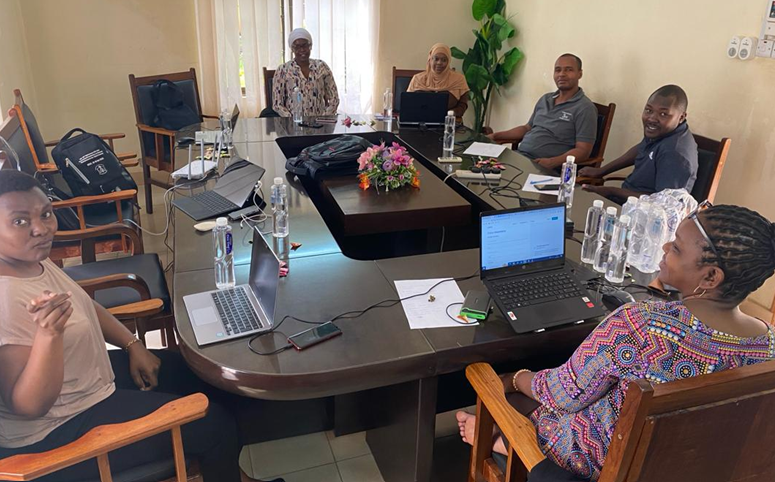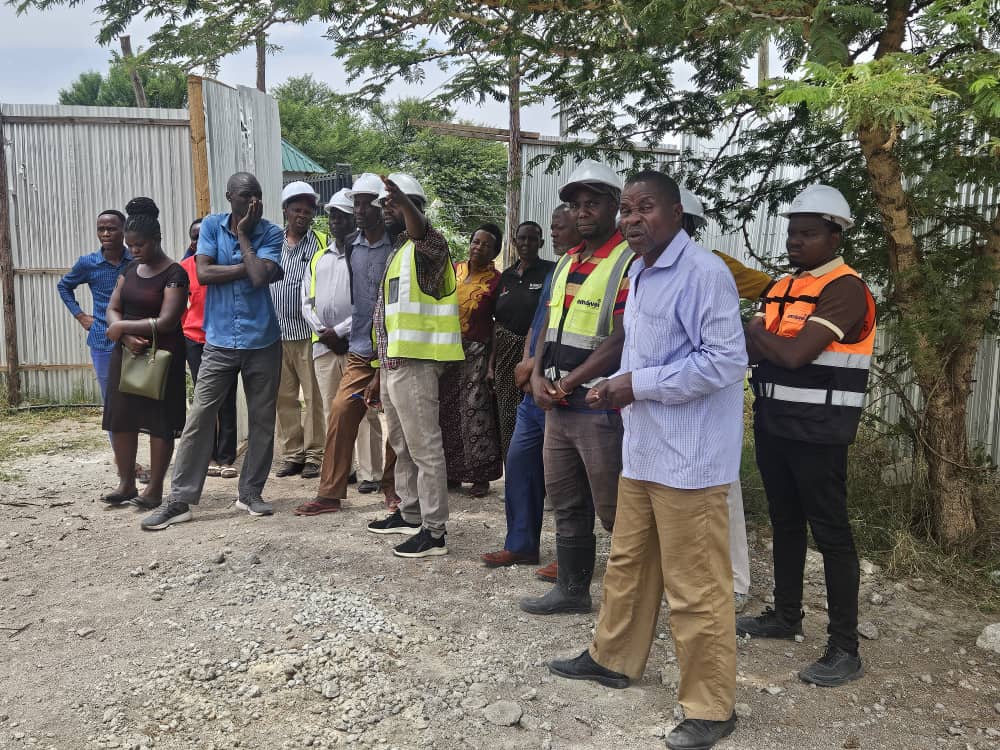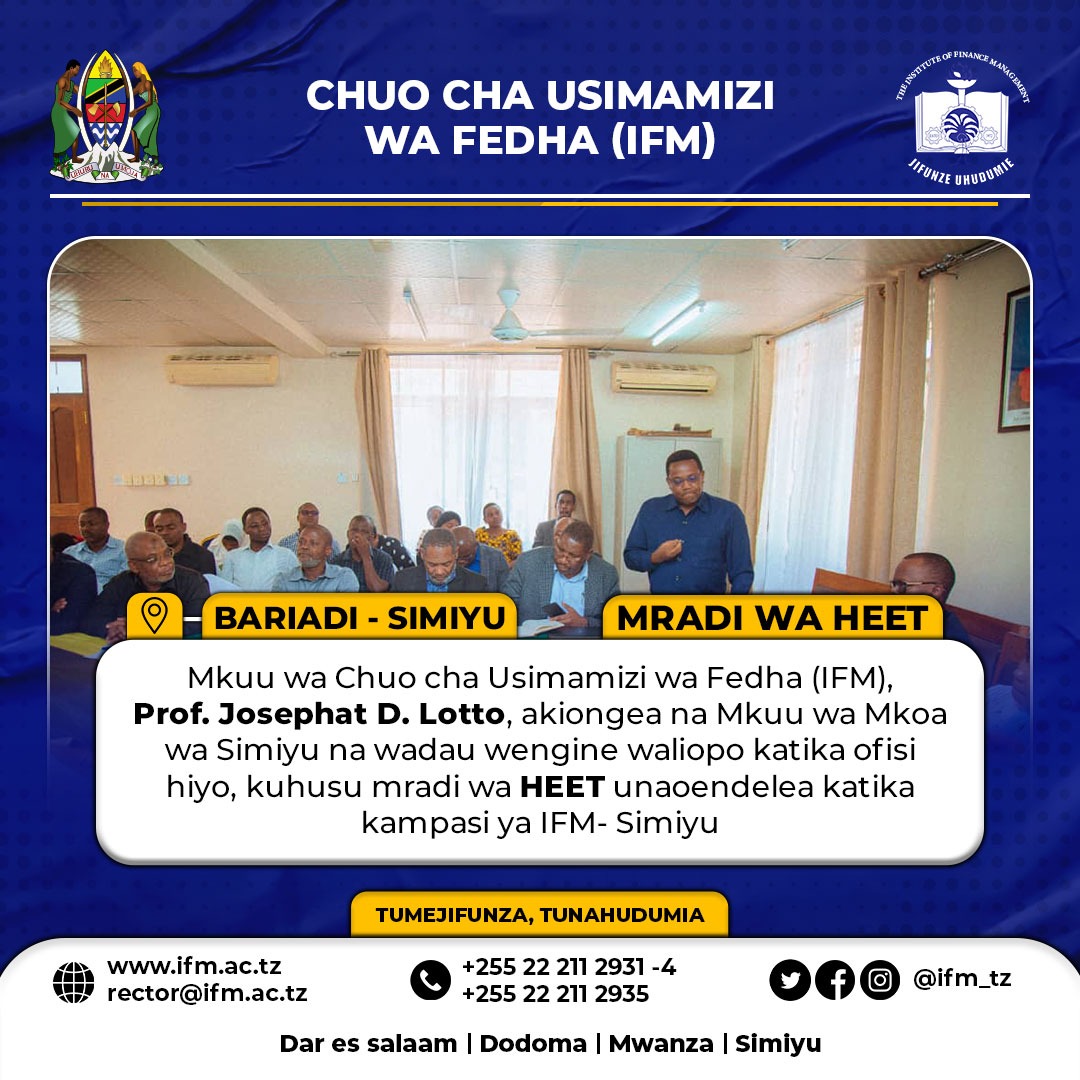

Driving Economic Growth through Education
The HEET Project in Action
Government of Tanzania and World Bank partner to fund the Higher Education for Economic Transformation (HEET) project, aimed at enhancing the learning environment and labor market focus of priority programs in beneficiary higher education institutions while improving the management of the higher education system.

About
The HEET Project
The project is designed to revitalize and expand the capacity of universities to contribute to key areas for innovation, economic development, and labor market relevance, by investing in requisite infrastructure for modern and effective teaching and research, and by training to the highest standard the teachers, researchers and administrators needed by universities to achieve to their full potential.
The main focus areas of the HEET Project
This area is concerned with the Institute plans to build the capacity of its senior staff to steer thedirection of training using advanced digital technology for the delivery of curricula toproduce employable graduates. Relevant interactions with senior counterpartleadership at universities where these digital environments are already operating shallbe arranged and implemented.
Moreover, short-term training will be conducted for members of the Management of
the Institute on transformative leadership, gender mainstreaming, and special needs
aspects of education services and Monitoring and evaluation (M &E) matters.
Activities
Specifically, the following activities will be performed in this area.
· Train staffs on how to use the installed equipment's and support student with special needs; Installed equipment's/materials/facilities are commissioned.
· Conduct training to academic staff on effective use of Moodle, upload learning material
· Conduct TOT to Curricula development teams and industry partners on pedagogical teaching and assessment methodologies
· Conduct TOT to academic staff on Online Pedagogical Content Knowledge and Development (instructional designs & curriculum development), online learning management systems, and train 10 technical staff on Multimedia content development
· Conduct TOT to academic staff on pedagogical teaching and assessment methodologies
· Building staff Capacity in conducting short courses, pilot sector relevant short courses conducted
· Conduct training to research teams/applicants, facilitate research teams in writing applications for external research grants
· Train project coordination team on project management
· Train staff gender moderation approaches
Focal Area Coordinator :
Building capacity of Academic staff and Institute leadership
This area focuses on enhancing the understanding of special education needs and disabilities among top management and staff, as well as increasing the comprehension of Virtual Learning Environments and pedagogical learning methodologies by top management.
Leadership training for management has been successfully completed, and staff training on how to support students and colleagues with special education needs has also been conducted and completed.
A total of 16 staff members, including those in top management, participated in study tours outside the country to broaden their exposure to modern teaching and learning technologies and practices.
Regarding gender and special needs, significant efforts have been made to develop and strengthen guidelines and affirmative actions. The preparation of guidelines for students with special needs and gender issues has been completed. Additionally, the design and drawings were reviewed, and an inclusive education awareness seminar for staff was successfully conducted. The identification of Gender-Based Violence (GBV) referral channels across all four campuses has been completed, as well as the establishment of gender desks at the IFM campuses in Dar es Salaam (DSM), Simiyu, Mwanza, and Dodoma.
The construction activities encompass the development of a Teaching Block, Hostel, Community Building (shops and ATMs), Dispensary, Sports Ground, and external works for Simiyu Campus, as well as a Female Hostel for Mwanza Campus.
The progress made so far includes the preparation of completion of an Environmental and Social Impact Assessment (ESIA) and a procurement of a consultant for review and supervision. Additionally, the tenders for contractor procurement were opened on 23rd August 2024 and the contractor is expected to be selected by the end of September 2024.
Shortage of skilled workers across essential sectors has been identified by the World Bank as a big challenge towards industrialization and development in Tanzania. Skills mismatches is highlighted as a factor which contribute to unemployment of graduates. It is argued to occur when academic disciplines are not in line with demand on the labour market, curricula are outdated, the content of programs have limited labour market relevance, and have limited emphasis on practical experience and soft skills. It also occurswhen teaching and learning facilities and technologies are outdated. To address these challenges, a sufficient stock of skilled human resources is desired so as to achieve semi-industrialized middle-income country status by 2025.
With the assistance of the World Bankunder the Higher Education for Economic Transformation Project (HEET), the Project Implementation Unit – Institute of Finance Management (IFM) is working on the project of reviewing and developing new curricula programs. IFM is among the Five higher education Institutions managed under the Ministry of Finance and Planning. The Institute has been identified as one of the priority Institutions under HEET project for provision of excellent practical training in key fields of accountancy, statistics, and financial management.
Prioritized institutional investments supported by the World Bank in curriculum review and development under the HEET Project involve curricula alignment with labour market needs, introduction of innovative pedagogical approaches and incorporation of cross cutting issues, including gender, climate change, special needs, internationalizationand digitalization. These interventions are expected to align existing curriculum with demand on the labour market, update our teaching and learning facilities and technologies, and improve our graduate practical experience and soft skills thus enhancing the country achieve semi-industrialized middle-income country status by 2025.
Focal Area Coordinator : Dr. Lilian Nyamizi
The activities in this area focus on the development of online learning platforms and digital technology applications. The customization of Moodle and its plugins has been successfully completed, and the system is now fully operational.
Additionally, training sessions for Moodle administrators and developers have been conducted, equipping them with the necessary skills to effectively manage the platform.
Furthermore, the capacity building within faculties for the use of digital technologies in teaching and learning is ongoing. Moreover, the integration of the Learning Management System (LMS) with the Education Management System (EMS) is also in progress and the specifications for the Multimedia Studio have been established.
The activities in this area are centered on promoting external linkages with the private sector and industry. Significant milestones have been achieved in this regard.
Firstly, the preparation of the Industry Advisory Council (IAC) guidelines has been completed, laying the groundwork for structured collaboration. Following this, the Industry Advisory Council was established, comprising 17 members, and the orientation for these members has also been successfully conducted.
In terms of formal partnerships, 10 out of the targeted 25 Memorandums of Understanding (MoUs) have been signed, representing 40% of the goal. Additionally, guidelines for the placement of staff and students have been developed, ensuring a clear framework for future engagements.
Lastly, the establishment of an external linkage department has been completed, providing a dedicated entity to manage and enhance these critical industry connections.
Inclusive education is an important area in education which accommodates all individuals despite their diversities. The approach celebrates individuals’ differences and offers an opportunity for vulnerable groups to enjoy the learning environment just like the rest through accepting, understanding and attending to the diversity. The essence of inclusive education is to make people with special needs in education feel welcomed and supported in their efforts. It is the opposite of segregation or marginalization of learning environments for persons with special needs in the general education system.
In recognizing that marginalization within the education system often marks the beginning of a lifetime of marginalization in mainstream society for people with special needs,the inclusive education area under the HEET project seeks to provide reasonable accommodation and equal access for these individuals. The area will ensure that individuals’ requirements are taken care of in order to facilitate effective education and individualized support measures for maximizing academic, social and career development. Ultimately, this area will guarantee that these efforts are sustainable by ensuring provision of guidelines and the establishment of a unit which will cater for the requirements of individuals with special needs.
Activities
Four main activities will be conducted to achieve the outcomes under the inclusive education area;
1. Reviewand development of theinstitute’s guidelines to accommodate students and staff with special needs
2. Awareness creation to the institute’s community on the issues related to special needs
3. Identification of students and staff with special needs
4. Establishment of a special needs unit to ensure sustainability of the project efforts
Focal Area Coordinator : Ms. Zubeda Chande
Monitoring, Evaluation and Learning (MEL) involves systematically tracking project performance based on prescribed indicators and activities to measure success or failure. It also serves as an early warning system for authorities to reveal and formulate redress or coping mechanisms by establishing a sound system for tracking performance and timely identification of challenges or risks.
The M&E expert will be responsible for MEL activities and will oversee the overall progress of activities for the smooth implementation of the activities as defined in the Institute Strategic Investment Plan (ISIP). In addition, the M&E expert establishes monitoring activities that ensure the process is in place by carrying out performance tracking continuously while conducting an in-depth strategic analysis of progression through internal and external evaluation mechanisms.
The activities in this area are focused on improving the quality of research, innovation, and knowledge exchange. Several key tasks have been successfully completed to advance these objectives.
First, the Terms of Reference (TOR) for reviewing the Research and Innovation Guidelines were prepared. Following this, new guidelines for applied research and innovation were also developed and finalized. To support the implementation of these guidelines, two training sessions were conducted, engaging 180 academic staff in applied research and innovation practices.
Additionally, guidelines for the development of incubators were created, providing a structured approach to fostering innovation within the institution. Finally, data collection tools were prepared to facilitate the engagement of industry partners in applied research, ensuring that research efforts are closely aligned with industry needs.
These activities represent significant progress in enhancing the quality of research and innovation within the institution.
The Team behind HEET Project
Dr. Bernard Mnzava
Industrial Linkages
Dr. Hamisi Sinde
Risk Management
Dr. Heri Mulamula
Monitoring, Evaluation and Learning
Dr. Ibrahim Kikwiye
Assistant Project Coordinator
Dr. Julius Raphael
Assistant Project Coordinator
Dr. Kadida Mashaushi
Project Coordinator
Dr. Khalid Mndeme
Applied Research and Innovation
Dr. Lilian Nyamizi
Curriculum
Dr. Michael N Sam
Communication and Media
Dr. Rosemary S. Massae
Social Safeguard
Mr. Alex Aley
Procurement Expert
Mr. Daniel Tairo
ICT/Digitisation
Mr. Furael Lema
Procurement Expert
Mr. Nicodemus Morembwa
Finance Expert
Ms. Jessica Chiwenda
ICT/Digitisation
Ms. Kalunde NtimizI
Construction of Infrastructure
Ms. Saumu Salum
Gender
Ms. Veronica Mironge
ICT/Digitisation
Ms. Zubeda Chande
Inclusive Education
News and Events

4 months ago
SPECIAL NEED DESK REVIEW WORKSHOP 2024

4 months ago
USHIRIKISHWAJI WA WADAU SIMIYU SEPTEMBER 2025

4 months ago
MRADI WA HEET BARIADI SIMIYU
